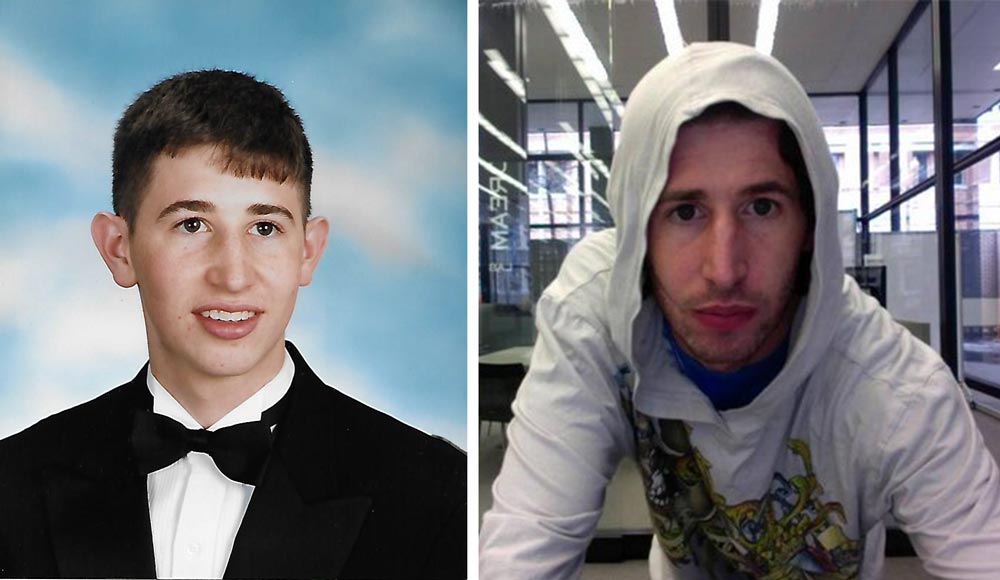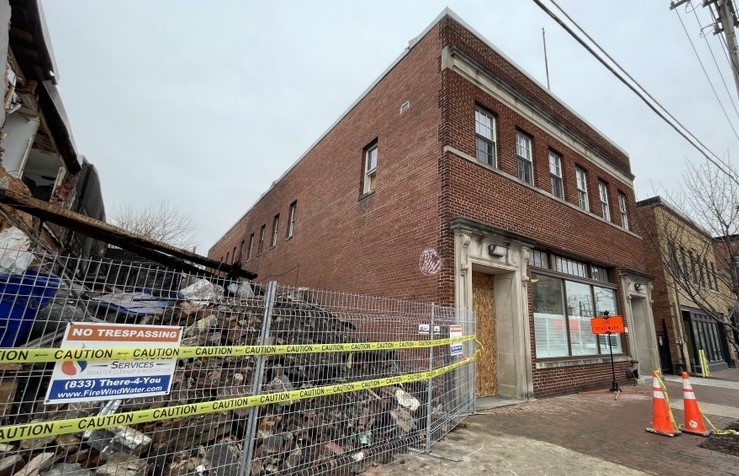Matthew Farkas, a resident at 801 East men’s shelter for several years, died on May 11, according to a police report. He was 36. It was exactly one month before his birthday.
Farkas’s mother, Benita Griffin, learned what had happened two days before Mother’s Day.
“I used to see him every Mother’s Day,” Griffin said. “He was so sweet; there were always so many notes and cards. We got together on most holidays.”
Matthew died 10 years after his brother, Dustin, who died six months after their father, Eugene.
Now the boys are buried together, with a headstone marking Dustin’s 23 years of life and a footstone on order for his brother. Griffin had been worried this would happen to Matthew for years. He was very sick.
His brother Dustin’s death, on the other hand, shocked the family. He was diagnosed as bipolar while in the Marine Corps and was put on medication just prior to his discharge. He was told he could follow up with Veterans Affairs for treatment. However, when he began to slip into depression and reached out to the VA medical center, he was not prioritized before he took his own life.
When he was young, no one suspected Matthew struggled with mental illness. “He was a bright kid. I’d catch him up late reading about Napoleon or the Ming Dynasty or something — for fun,” Griffin recalled. “Who does that?”
Matthew was born in Detroit, Michigan, and moved to Fairfax County in 1996 with his mother and younger brother. The move was right before he started high school, which he was on track to finish early in three years. “He was so smart,” Griffin said. “He could have gotten into college anywhere.”
Most mothers think the world of their children, and Griffin is no exception. She described Matthew as funny, brilliant and handsome. To his credit, “Mr. Dapper” chose to wear a sport coat and tie to school for his ninth-grade photo. He was a Future Business Leader of America and adored by the program’s faculty advisors. He purchased a house in Manassas at 20 years old and bought a second one to rent out the next year.
“He marched to the beat of a different drummer,” Griffin said. But as he got older, Matthew started to behave strangely. He’d make choices that weren’t logical, and sabotage himself.
He was caught stealing and was thrown out of school. He tore wires out of the walls in an apartment he was renting — fearing surveillance equipment — and was evicted. Matthew’s behavior became increasingly erratic and his thinking more delusional. It turned out he was abusing methamphetamines. Griffin attributed his downward spiral to the drugs, as did her family.
“I had to set boundaries,” Griffin said. “I didn’t cut off contact … but I wouldn’t give him money.
She worried about Matthew constantly, especially once he was living at the shelter. He was frequently beaten up: in his bunk, in the shower, outside.
Griffin bought him a cell phone to keep in touch more easily. A couple weeks later, she called and a strange voice answered. The phone had been stolen, and the man who answered said he had bought it off someone else. “Well, enjoy it while it lasts,” Griffin remembers saying. “Because I’m having it turned off.”
The man brought the phone to Matthew, broke it in front of him, and beat him up. Griffin did not get him another. Griffin said that whenever she visited, she would beg. “Matthew, when are you going to get help?”
In 2011, Griffin asked Matthew to let her accompany him to his doctor appointment at Whitman Walker Health. The doctor was thrilled to meet her. “Oh, I’m so glad Matthew has someone to help him. My biggest concern is his paranoid schizophrenia.”
A bomb had dropped. The diagnosis explained so much, Griffin recalled thinking. How could this not have come up before? How could she not have considered it? How could she help her son?
Matthew became furious with the doctor for sharing that information. “You’re fired!” he said, before storming out. Griffin remembers anxiously apologizing, stating that she did not want to jeopardize Matthew’s trust in his health care provider.
But the doctor was nonchalant. “Oh, don’t worry, he fires me all the time.” Another glimpse of the delusion and illogic in her son’s life.
Could the drugs have contributed to his mental illness? “Unlikely,” the doctor said. The drugs were probably his form of self-medication. Mental illness and substance abuse disorders are often “co-occurring.”
This changed everything. How could she have supported her son when he first began acting strangely? Was it too late? The questions hurt then. They burn white-hot now, after Matthew’s death, which was ruled as accidental and caused by acute methamphetamine intoxication, according to the Office of the Chief Medical Examiner.
Despite the diagnosis, Griffin was able to do little more than watch medical professionals respond to his symptoms without ever addressing his illness. “There is no parity when it comes to providing treatment for mental illnesses when compared to a physiological illness,” Griffin said.
After everything her son went through, Griffin felt like Matthew’s life was not valued by society.
He lived for years in a shelter with a floor devoted to a “Transitional Rehabilitation Program,” managed by a nonprofit that also runs one of the highest-rated behavioral health providers in Washington, D.C., according to the Catholic Charities D.C. website.
When Matthew dropped out of contact with his mother for several weeks in 2014, and she found him in the ICU at George Washington University Hospital, bile was caked around his face and on his teeth, left over from when he was intubated. He had developed a drug-resistant infection common in hospitals because of unsanitary conditions. He had also contracted pneumonia, caused by aspiration during intubation, and suffered multiple organ failure — all during the 10 days he had been hospitalized for an overdose, before Griffin arrived.
“He was still filthy, as if he had just been found that day,” she said. “They tried to keep me from seeing him. When I got back there, a nurse showed up and started trying to clean him up. ‘Where were you for the past 10 days?’ I yelled. Because he was homeless, he didn’t matter to them.”
Griffin became a registered nurse after her first son died. She said it was her way of surviving by staying busy and doing something good for others. Now she wants to help people going through what Matthew went through, and their families. But she wonders where to start.
One Fourth of July, Matthew was stabbed in the face on a Metrobus by a woman in Capitol Heights, Maryland. The woman had watched him board the bus without paying the fare. She said something about it before pulling the knife. Matthew needed 150 stitches, and the woman was convicted of assault with a deadly weapon. She received a 10-year suspended sentence.
“They placed her on probation. They said, ‘Well, she doesn’t really belong in prison,’” Griffin said. “Which is correct; she needed treatment. They both did. And neither of them got it.”
When Griffin arrived to claim her son’s possessions from the shelter in Southeast D.C., the sole item he had left, aside from a set of keys, was a ragged blanket, worn completely through.
“I had made him quilts, and he would lose them, or were more likely stolen from him. Who knows? I would offer to get him anything he needed, ” Griffin said. “But he was always getting robbed and beaten up. Giving him things only made him a target. Where was the help for someone like him?”
Update (07.16.2018)
This article was updated to include the cause and manner of death, which was still unknown by Matthew’s family when Street Sense went to press.








